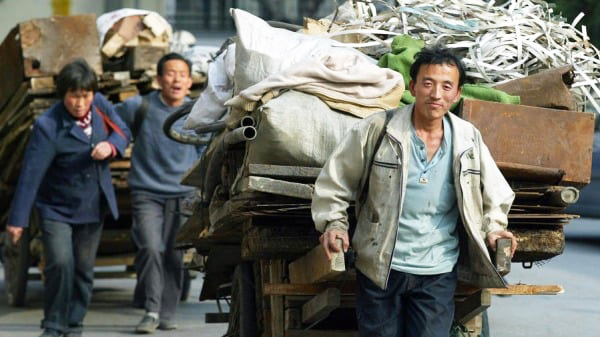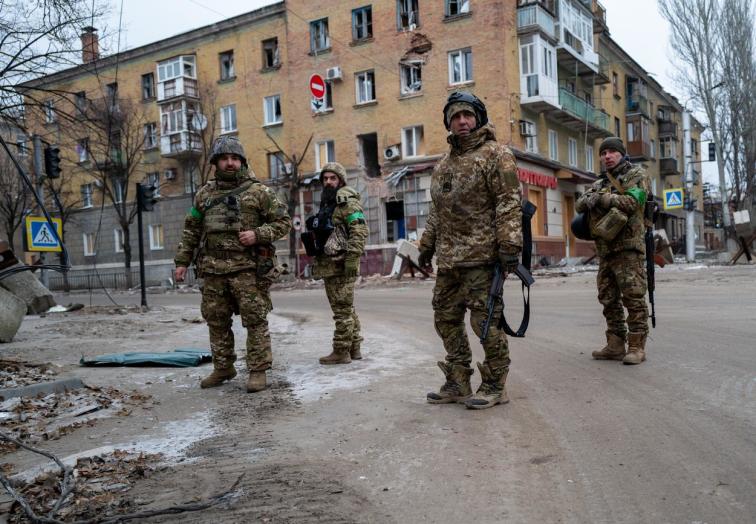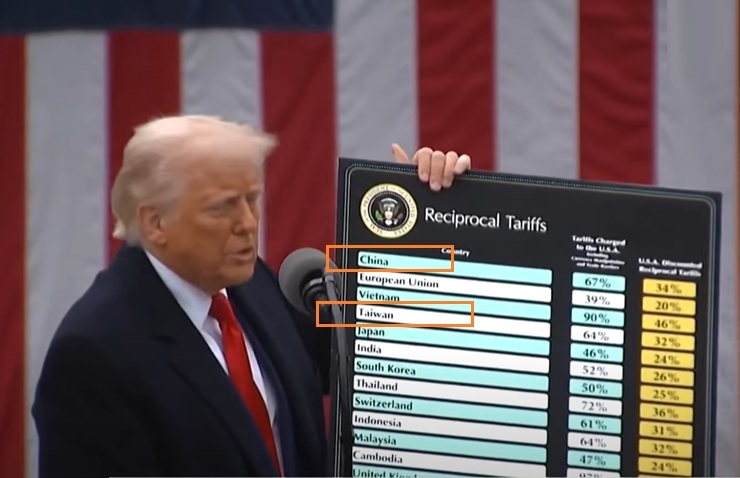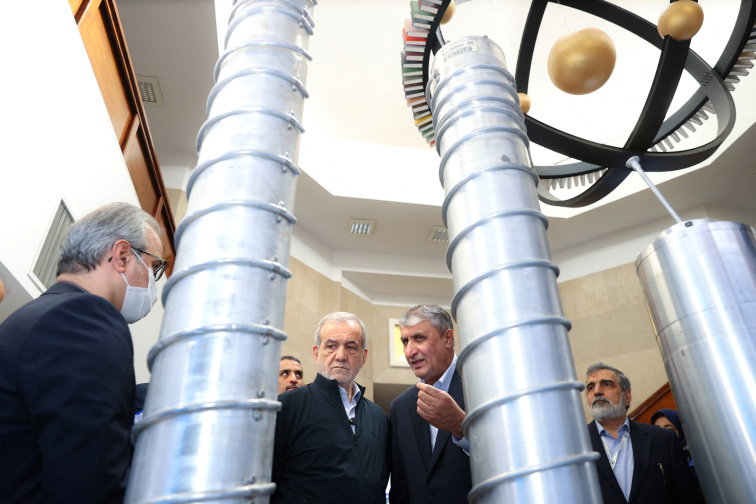Migrant workers around Shanghai are working while pulling flatbed garbage carts.
[People News] The United States has raised tariffs on Chinese exports to as high as 125%. On April 10, Chinese Foreign Ministry spokesperson Mao Ning reposted a video of Mao Zedong on the platform X, writing in English: "We are Chinese. We are not afraid of provocation. We will not back down."
The video features a speech by Mao Zedong at the closing meeting of the Fourth Session of the First CPPCC (Chinese People's Political Consultative Conference) in February 1953. While discussing the Korean War, Mao said: “However long they want to fight, [we] will fight just as long—until [we] achieve complete victory!”
Where did Mao Zedong’s confidence come from? It came from the 400 million reserve troops of human cannon fodder at the time. Where does Xi Jinping’s confidence in confronting the U.S. in a tariff war come from today? From Mao Zedong's strategy of yin-yang scheming, and from the CCP’s so-called "mass line", which, in today’s context, is essentially a populist "chives line" (a reference to people being used and harvested like chives).
As the Chinese Foreign Ministry shouts slogans like “We’re open to negotiations, but ready to fight to the end,” the People’s Daily on April 7 prominently displayed Xi Jinping’s quote: “Thrift is our family heirloom. It must never be discarded.” The paper also wrote: “Back then, revolutionary leaders like Mao Zedong lived in cave dwellings in Yan’an, ate coarse grains, wore coarse clothes, and used the ‘Yan’an style’ to defeat the ‘Xi’an style.’” And, “Poverty doesn’t come from eating or clothing, but from failing to plan ahead.”
With the China-U.S. trade war, the CCP is preparing to fight another Battle of Triangle Hill (a major Korean War battle). The regime isn’t afraid of its people eating tree bark—they can survive on grass for three years. "Thrift is our family heirloom?" No, thrift is the CCP’s heirloom for fooling the chives! From the eight-year war against Japan, to the Korean War, to the China-U.S. trade war—no matter what war is fought, the Party’s tradition of privileged special supply must be preserved, and corruption must remain consistent from start to finish!
Diligence and thrift are virtues, even a form of wealth. For thousands of years, traditional Chinese culture has regarded hard work as a moral virtue. From commoners to emperors, the value of “diligence in virtue” has been highly praised. Ouyang Xiu once said: “Hardship can revive a nation; indulgence can destroy one—this is the law of nature.” Whether in the court or in local clans, or in the fate of officials, diligence, frugality, and perseverance have always been seen as passports to success.
It’s precisely because of this that the culture of hard work and frugality has become a vivid narrative in the CCP’s story of “China.” It serves as a beautiful landscape to showcase the “world’s factory” and has become a natural trump card for marketing Chinese-made products. Chinese people’s hardworking culture has become the core material of the CCP’s global propaganda and the business card of its export economy.
The various unpaid overtime systems in China's manufacturing sector, such as 996, 886, 715, and 007, along with assembly line workers earning less than 10 yuan per hour, have resulted in nearly a trillion dollars in trade surplus for the Chinese Communist Party (CCP). However, this has also led to countless workers ending up in ICU wards, with some tragically taking free falls from factory rooftops, becoming a stark footnote to the CCP's foreign ministry spokesperson's assertion of a 'best period for human rights.'
No nation or ethnic group can claim a monopoly on human wisdom and hard work, yet the totalitarian regime of the CCP can monopolize power, allowing a small elite to amass wealth while the vast majority are effectively 'monopolized' into poverty. This has given rise to the euphemism 'common prosperity.' However, the reality is that the end of common prosperity is common poverty, a truth that many Chinese people have come to recognize, leading to a sense of loyalty born from their inability to escape their circumstances.
The wave of globalism and the globalized economy have facilitated the CCP's export of this seemingly admirable, yet low-human-rights labor culture. Under the pretense of peaceful coexistence, win-win cooperation, and fair trade, the CCP seeks to export common poverty to countries worldwide through low-price dumping, thereby aiming to dominate the global manufacturing supply chain.
The diligence, frugality, and resilience of the Chinese people have been weaponized by the CCP. With state subsidies, cheap dumping, and low-cost supply chains, this almost predatory model of foreign trade is bound to provoke a backlash from the West against the CCP in due time.
Since the era of Mao Zedong, the Chinese Communist Party (CCP) has been plotting to compete with the United States, employing primitive methods to produce steel, which has caused immense suffering for the entire nation. Xi Jinping took over two legacies from the CCP regime: one is Deng Xiaoping's reform and opening-up policy, which emphasizes hiding one's strength and biding one's time, and the other is Maoism's directive to abandon illusions and prepare for battle. Without hesitation, Xi Jinping cast aside Deng Xiaoping's approach and embraced the stick of Maoist fundamentalist communism, vigorously wielding it. Early in his administration, he focused his attention on the United States. In 2015, the CCP launched 'Made in China 2025,' an ambitious initiative aimed at overtaking the United States. In terms of strategy, approach, and execution, Xi's grand vision of replacing U.S. hegemony is being systematically pursued. However, human plans often fall short of the heavens' designs. Over the past decade, Trump emerged twice, and the trade war directly disrupted Xi Jinping's grand aspirations for China's manufacturing sector.
Within the political context shaped by the struggle philosophy of CCP culture, many seemingly plausible yet false propositions have emerged, such as 'backwardness leads to being beaten' and 'weak countries have no diplomacy.' Ironically, the CCP uses undeniable facts to justify these fallacies. The CCP claims to be the world's second-largest economy, promoting the narrative of the East rising and the West declining, presenting itself as a formidable power and a manufacturing giant. So why was it struck down by Trump and ostracized by countries worldwide? The reality is that those who engage in despicable actions will face consequences, and wolf warrior diplomacy has no place in international relations.
In this anti-human machine of the CCP's totalitarian regime, the more industrious Xi Jinping becomes, the closer the nation edges toward ruin. As the CCP weaponizes trade, the harder the Chinese people work, the more they will suffer.
A mainland blogger stated, "The entire world is boycotting us. Just look at what happened in 2024. Recently, Mexico shut down the Yiwu Commodity City in China, TIM was also suspended in Vietnam, India has increased tariffs on Chinese steel, and even Russia has begun taxing our cars. People are starting to think this is all aimed at us. The underlying reason is our own low-price strategy. Our approach to business development is to enter a new market and first slash prices. For instance, in Europe and America, a pair of socks costs 20 yuan, but when we enter the market, we sell them for just 5 yuan. Initially, everyone could profit, but by undercutting so drastically, we end up harming the competition. Do you really think they won't boycott us?"
"So, why can China keep prices so low? There are two main reasons. First, we have low labor costs. We earn only 50 yuan for 10 hours of work, and this often requires us to voluntarily work overtime, accept pay cuts, and endure tough conditions. The second reason is the low cost of our supply chain. While it may appear that we Chinese are incredibly hardworking, the reality is that we have disrupted the established rules of the global economy."
For instance, CRRC Group participated in a bidding process in Bulgaria, offering a price that was 17.5% lower than that of a Spanish competitor. Logically, they should have won the bid without any doubt, yet CRRC was ultimately disqualified. Why is that? Because people simply do not believe that workers can accept such low wages, be willing to work overtime, and still produce high-speed rail products that require advanced skills and performance. There must be some hidden issue. Additionally, when our new energy electric vehicles are exported, 80% of the components are sourced from our own products, leaving no market share for the other party. While this may seem unbeatable, it conceals a significant crisis, and in the end, we risk becoming isolated. Engaging in brutal price wars to deplete your own ecosystem will ultimately lead to being overwhelmed by the competition.
The blogger has articulated this very clearly. However, expressing such views domestically is challenging, as there is a reluctance to directly criticize the Communist Party's system. Why do hardworking Chinese people face increasing adversity? The root cause lies with the Communist Party. The world has long suffered under its rule. The stronger the Communist Party becomes, the more barbaric it acts; the more developed it is, the more malevolent it becomes; and the more it progresses, the more it transforms into a monstrous entity. Now, they have found themselves at the mercy of Trump’s scrutiny, awaiting exposure of their true nature.
(Originally published by the People News)








News magazine bootstrap themes!
I like this themes, fast loading and look profesional
Thank you Carlos!
You're welcome!
Please support me with give positive rating!
Yes Sure!